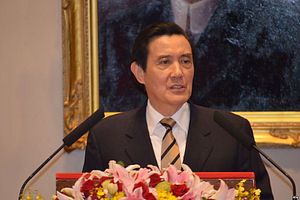Last Sunday, the new Taiwanese government rejected former President Ma Ying-jeou’s proposal to visit Hong Kong and deliver a speech at the Society of Publishers in Asia (SOPA) Awards, and for at least three years from now on, Ma will not be able to call the shots on prospective travel overseas.
According to Taiwan’s Classified National Security Information Protection Act, former heads of state are required to obtain approval for any plans to travel overseas within three years after leaving office. An application regarding said travel plans should be filed at least 20 days prior to the former president’s planned departure.
In 2008, Ma himself had proposed to put his own name on the nation’s immigration control list when his term ended, as a way of aiding the Taiwan High Prosecutors Office in keeping an eye on former President Chen Shui-bian’s whereabouts. Chen’s corruption and money laundering case was under investigation at the time, but the presidential office’s offered help did not come in handy as three months later, Chen was restricted from leaving Taiwan.
Prior to Ma, no former head of state has proposed an overseas trip within three years of leaving the office.
President Tsai Ing-wen appointed Presidential Office Secretary-General Lin Bih-jaw and National Security Council Secretary-General Joseph Wu to evaluate Ma’s application, as “the relationship between a retired president and national security is a sensitive and particular matter.” Having solicited opinions from six government agencies including the Mainland Affairs Office, which is in charge of cross-strait relations on Taiwan’s side, the group arrived at the decision to advise Tsai to reject Ma’s proposal.
The reasons for the rejection include the need to keep national classified information made known to Ma confidential, and that a longer period of time is needed to assess said information before Ma could be granted a trip overseas. The two other reasons were the challenges involved in managing the potential risk of granting a former president a visit to Hong Kong, a rather sensitive place where national security is concerned, and the lack of ample communication with China and Hong Kong due to the shortage on time.
Ma’s office responded with immediate backlash, saying that the entire visit would be made transparent to the public; he would be back in Taiwan within seven hours of stepping into Hong Kong, and he would not even have time to visit his daughter, who was living in the city currently.
The presidential office’s decision drew mixed opinions across Taiwan. In the pro-Ma camp, Kuomintang Legislator Lin Te-fu accused Tsai’s decision of being politically loaded and her reasons illegitimate, while Tsai’s Democratic Progressive Party spokesman Yang Jia-liang urged Ma to accept the presidential office’s decision with good grace.
































